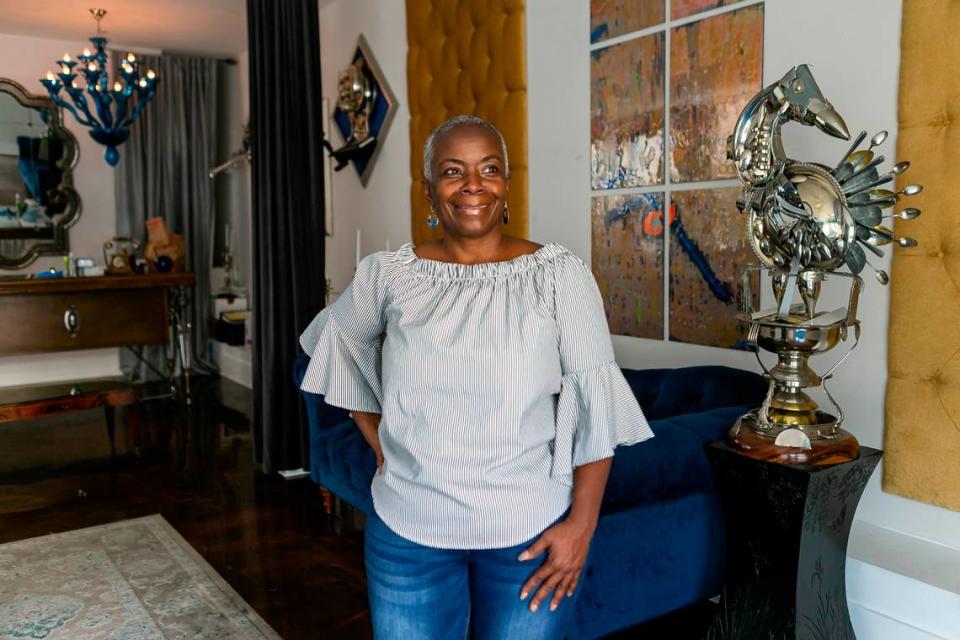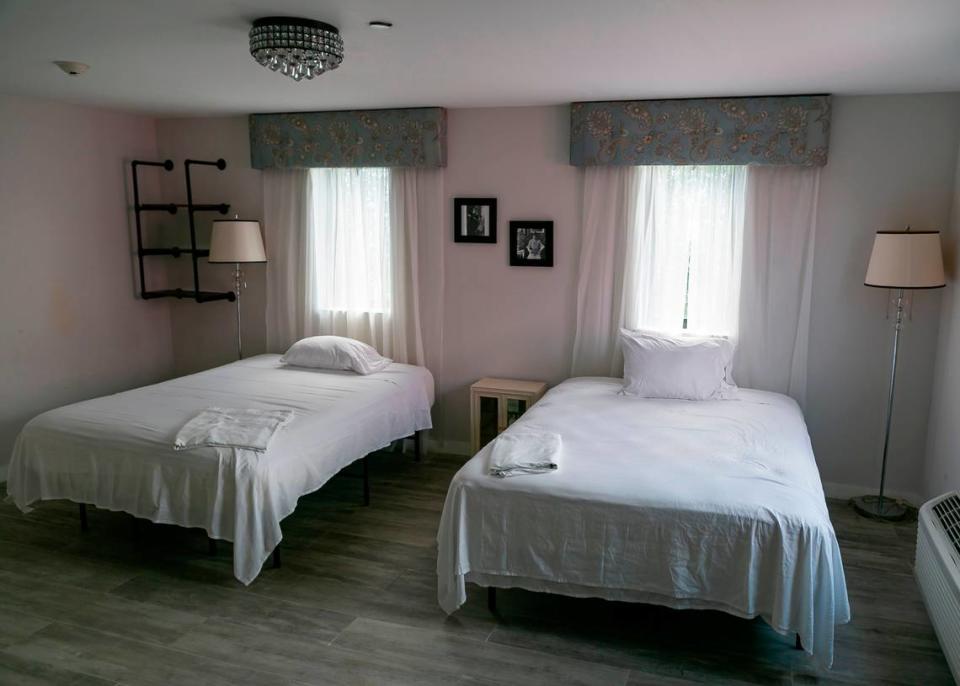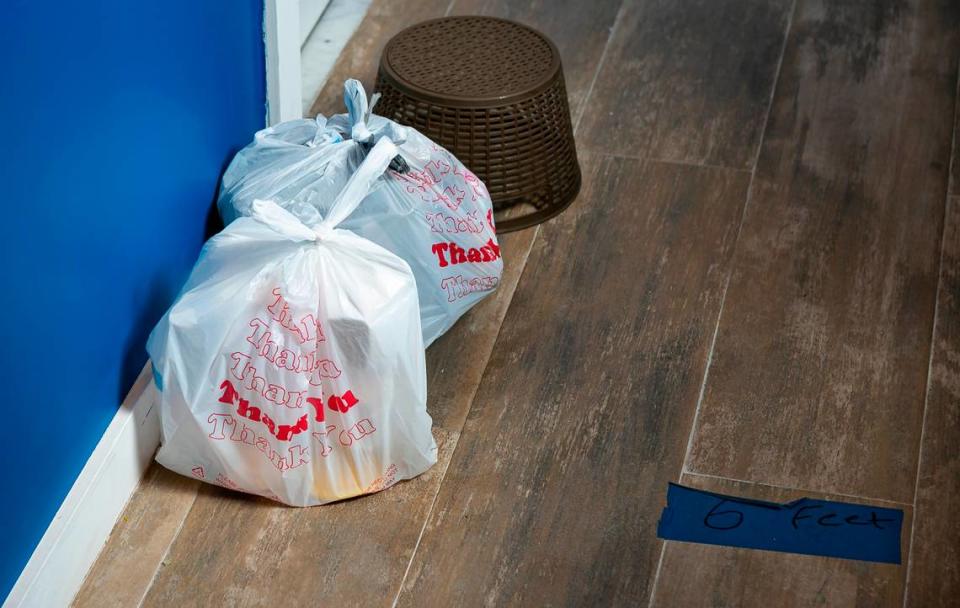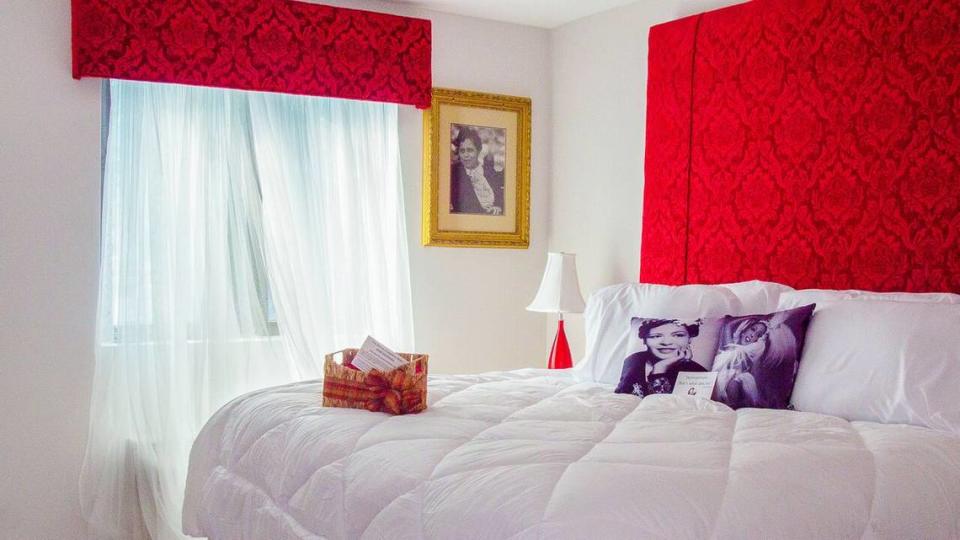This stylish boutique hotel in Overtown is now sheltering the county’s homeless
After years in the works, the historic Black-owned Dunns Josephine Hotel in Overtown reopened last December to rave reviews.
For the first few months, owner Kristin Kitchen could hardly keep up with her phone’s constant buzzing as reservation requests poured in. But as COVID-19 swept the nation, the reservations soon turned into cancellations.
“I went to sleep with a big pit in my stomach,” Kitchen said. “I waited years for this. This couldn’t be the story. We couldn’t shut down.”

Kitchen contacted the Miami-Dade County Homeless Trust and opened the Dunns Josephine’s doors to some of the county’s most vulnerable.
In April she inked a $32,200 monthly agreement with Miami-Dade County to rent out the hotel’s 15 rooms. As of late August, 104 guests have stayed at the Dunns Josephine Hotel after contracting COVID-19 or being exposed to the virus on the street or while living in a shelter.
The hotel was the first to raise its hand to partner with the trust, but it’s now one of five locations in the county that have hosted at least 1,176 COVID-exposed guests to date.
“We’ve got a problem and they’ve helped us solve it,” said Ron Book, chair of the county Homeless Trust.
Book credits the partnership with local hotels with helping keep the COVID-19 rate low among Miami’s homeless population, estimated at around 3,628 people with 1,008 of those living on the streets, according to the trust’s count earlier this year.
Book is especially proud that the partnership has included a local hotel owned and operated by women of color, he said of the agreement with the Dunns Josephine.
“I’d say 100% it’s allowed us to keep the hotel open,” said Metris Batts-Coley, director of sales and marketing at the Dunns Josephine.

With 20 years of experience in the public health sector, including as an HIV/AIDS coordinator at the Palm Beach County Health Department, Batts-Coley’s resume has led her directly to this job. She and Kitchen quickly set to work turning the Harlem Renaissance-inspired hotel into a space fit for quarantine.
The scent of bleach now takes over the space every two hours. A bottle of Spic and Span disinfectant spray stands at the ready next to one of the music-themed sculptures that dots the hotel. Gone are the plush armchairs that paying guests once gushed over and that gave the lobby its cozy and Instagram-friendly vibe. In the rooms, most of the decorations have been removed to limit contamination; only the T.V.’s, beds and tables remain.
When the hotel first opened in December, each room was named after prominent Black writers and musicians. Inside the Marcus Garvey room – now room 1 – cleaning supplies and paper bags with snacks await the next guest.
Guests are not allowed to exit their rooms unless they’re going to a specified appointment, but they’re equipped with a cellphone so they can stay in touch with Batts-Coley in case they need any items. Staff does not enter rooms during a guest’s stay, but laundry service is available. Meals provided by the Chapman Partnerships and donated items are left outside each guest’s door.
Length of stay is set case by case. Some guests stay just a few weeks, until they test negative and are able to return to a shelter. Guests over 60, or who have underlying health conditions stay until longer-term housing can be identified.
“For a hotel that was brand new, this gave us the opportunity to utilize every nook and cranny of the facility,” Batts-Coley said. Having most of the rooms rented for a long period of time has allowed her and Kitchen to note the wear and tear that the furniture can withstand and the sounds that echo through the royal blue walls when there’s a full house.

On a recent weekday, a baby’s cries could be heard down the hall. A mother and her two toddlers, one with cancer, were staying in one of the rooms.
Guests have included working people, elderly residents, a pregnant woman and those with young children.
William Renfroe has been staying at the hotel for a little over two months, after he first came down with COVID symptoms. Though he has tested negative, the 62-year-old is considered highly vulnerable. It’s the first time in more than a year he has had a room to himself. He’s not sure how much longer he’ll be able to stay at the Dunns Josephine, but unless he can find stable housing he knows where he’ll go to next.
“I’ll go back to the street,” said the former maintenance worker. “On the street I can get to myself. When you go to a shelter, you’re in a room with 50 to 60 different men above and below you. You don’t have room to get your foot down. There’s no distancing there. That’s why I’m not going back.”
Renfroe said he moved to Miami about seven years ago with his companion of 23 years. At first they rented an apartment together, but when she died two years ago, he was left on his own. His uncle and father passed away that same year. “I lost the people who were on my side,” he said. Renfroe was left with nothing but debt.
“I’d like to stay here for a minute more,” he said Tuesday before he headed out to a socially distanced job interview. “Here at this hotel these people are super cool. They’re honest. Ms. Metris and Ms. Kitchen have been extremely good to me; I’ve seen them be extremely good to others.”

It’s small things they’ve done to help, such as fetching groceries for him, that have been most meaningful.
The homeless life, he said, is not for him. But getting back on your feet takes time, he added.
Like Renfroe, Phillip Roundtree wishes he could stay at the Dunns Josephine for just a little bit longer.
“Each and every day I pray to God because I’ve been here the longest of anybody and I’m afraid that one day they’ll tell me my time here is up,” he said. “I won’t have nowhere to go.”
Roundtree, 60, has been at the Dunns Josephine for about three months. He’s undergoing chemotherapy for prostate cancer and was sent to the hotel after a nearly year-long stay at Camillus House.
He came to the Dunns Josephine with the clothes on his back after he was barred from returning to the shelter to pick up his belongings because of the health risk, he said.
Her homeless guests have taught Kitchen a sad truth. “The state of being homeless makes people nameless and faceless,” she said.
Kitchen said she’s gotten calls from other hoteliers curious about how things are working out. The first thing they usually ask is whether the place has been trashed. It speaks to the lack of understanding that exists about the homeless population, said Kitchen.
“You know who the homeless people are going to be in three months? Your staff,” Kitchen tells them.
Kitchen is founder and CEO of Sojourn Heritage, a boutique hotel brand. She also owns a bed-and-breakfast that previously was part of the Underground Railroad in Ohio.

“It’s kind of my thing to take old historic buildings and tell the African-American story,” said Kitchen. “I like to take something, rehab it and make it beautiful again.”
Her plans at the Dunns Josephine were to bring back the spirit of a place that once catered to Black musicians and entertainers in a segregated south, when Miami Beach hotels were off limits to people of color. The two-story space originally housed two hotels: the Josephine, built in 1938, and the Dunn, built in 1947. Kitchen named each suite after a Black cultural icon, paying homage to artists who once frequented Overtown when it was considered the “Harlem of the South.”
As the initial 30-day contract with the trust has turned into months, Kitchen doesn’t know when her plans will get back on track.
But Kitchen is okay with that. Right now, she said, the community needs a shelter more than it needs a hotel.

